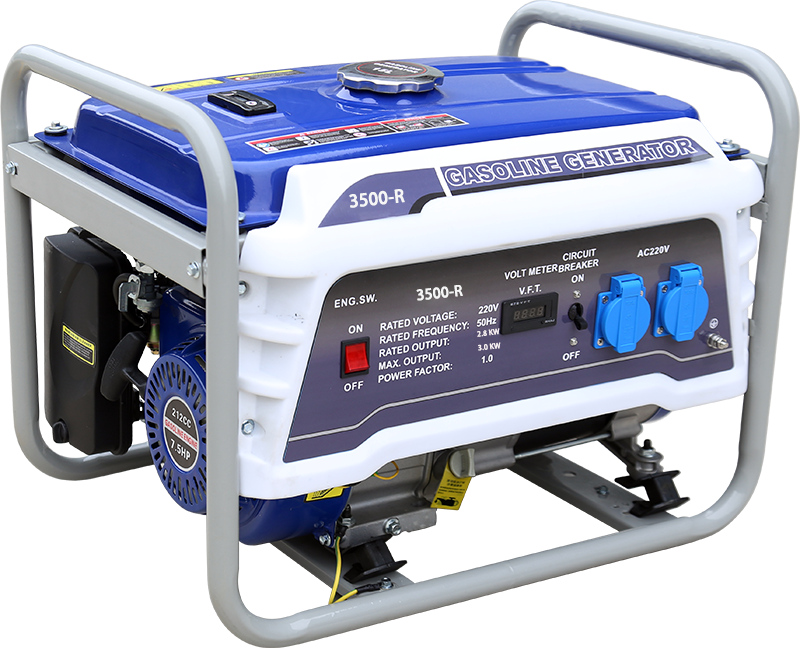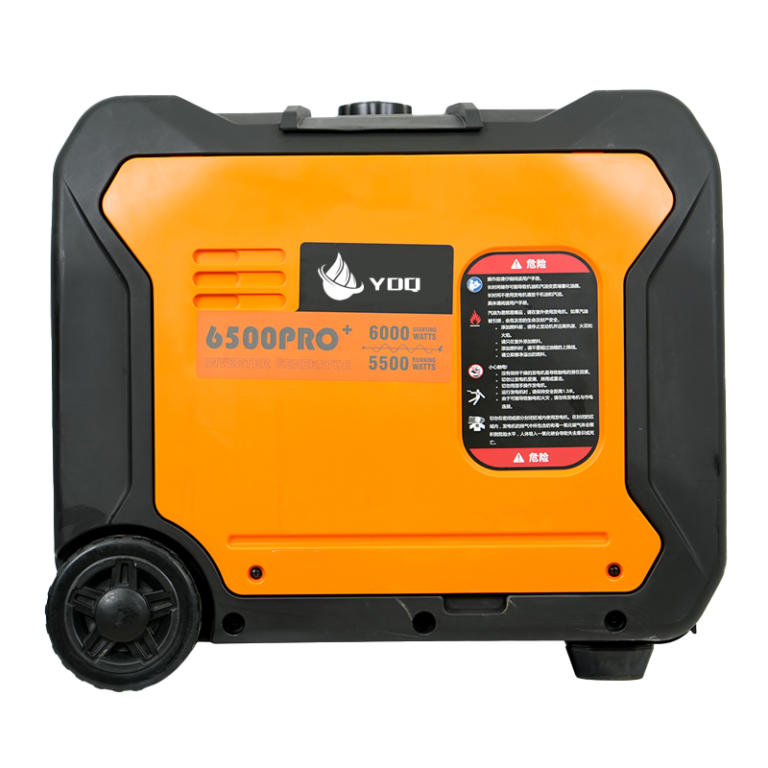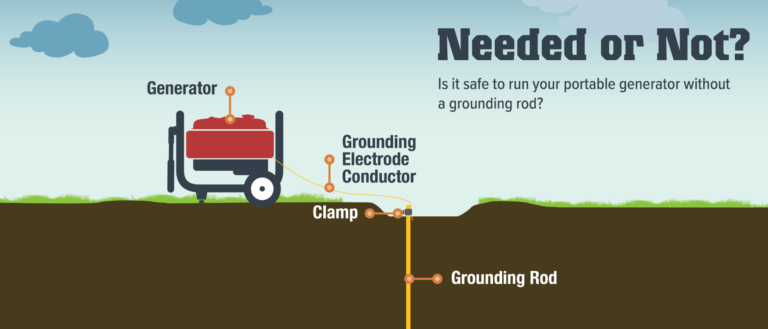Inverter VS Generator
Portable generator is a standalone power generation device that can be moved from one place to other place to provide power when the main power source is unavailable or to provide reliable, high-performance power to remote job sites. It typically consists of an internal combustion engine that runs on gasoline, diesel, propane, or natural gas, and an alternator to generate electricity.
Portable generators have different sizes and power capacities, from small generators suitable for powering a few appliances or tools to larger generators capable of providing backup power to an entire house or construction site. They also come with outlets so users can plug in electrical devices or extension cords to get the electricity they generate.
Portable generators are usually used for equipment while camping, tailgating, and outdoor activities, as well as in emergencies such as power outages caused by natural disasters or grid failures. The portability of generators makes them easy to transport and install wherever temporary power is needed.
Type of generator
Generators can be divided into inverter and general generators according to their working principles.
General generators are powered by fuel and mechanically convert mechanical energy into electrical energy, usually using the principle of electromagnetic induction.
Inverter generators convert DC power into AC power through electronic devices (such as inverters) and can control the output voltage and frequency to achieve power regulation and stable output. Therefore, variable frequency generators are more suitable for powering sensitive power equipment.
What is an inveter generator?
An inverter generator is a generator that can adjust its output voltage and frequency as needed. It uses modern electronic technology, usually including an inverter and control system, to convert the input DC power into the required AC power. This kind of generator is usually used in applications that require high power quality, such as medical equipment, computer systems, and situations where stable power supply is required for electrical equipment.
What is general generator?
Traditional generators are also called general generators, refer to those generators that use mechanical methods to convert mechanical energy into electrical energy. Each cylinder performs work in a certain order. The thrust acting on the piston becomes the force to push the crankshaft to rotate through the connecting rod, thereby driving the crankshaft. Rotate. By installing the brushless synchronous alternator coaxially with the crankshaft of the power machine, the rotation of the power machine can be used to drive the rotor of the generator. Using the principle of ‘electromagnetic induction’, the generator will output an induced electromotive force, and a current can be generated through the closed load loop. . Traditional generators include various types, such as diesel generators, gasoline generators, and natural gas generators.
What is the advantage of inverter generator?
Adjustable voltage and frequency: The inverter generator can adjust the output voltage and frequency as needed to adapt to different electrical equipment and application requirements.
High stability: Due to the use of advanced electronic control technology, the output voltage and frequency stability of inverter generators are usually high and can provide reliable power supply.
Wide scope of application: inverter generators are usually suitable for fields with high power quality requirements, including medical equipment, computer systems, precision instruments, etc.
Energy saving and environmental protection: Compared with traditional generators, inverter generators usually have higher energy efficiency and can reduce energy consumption and environmental pollution.
What is the advantage of general generator?
Stable and reliable: Traditional generators adopt the principle of mechanical conversion, have a simple structure, are stable and reliable, and have high working reliability.
Widely applicable: Traditional generators can use many types of fuel, including diesel, gasoline, natural gas, etc., so they have a wide range of applications and can meet the needs of different occasions.
Large power output: Traditional generators have a wide range of power outputs, from small portable generators to large industrial generators, to meet different power needs.
Easy to maintain and repair: The structure of traditional generators is relatively simple, and maintenance and repair are relatively easy. They usually only require regular maintenance operations such as regular cleaning, replacement of filters and engine oil.
Lower cost: The manufacturing cost of traditional generators is relatively low, and the cost of purchase and maintenance is also relatively low, making it suitable for use in some situations with limited budgets.
The application of inverter generator
Due to its adjustable voltage and frequency and stable output, inverter generators are suitable for a variety of scenarios that require high power quality and adjustable voltage and frequency.
Medical equipment: Medical equipment has extremely high requirements on power quality and requires stable voltage and frequency. Inverter generators can provide high-quality power supply to ensure the normal operation of medical equipment.
Computers and IT Equipment: Computer systems and other IT equipment require very high power stability to avoid data corruption or system crashes. Inverter generators can provide stable power and ensure the safe operation of computer systems.
Precision instruments: Many precision instruments have extremely high requirements on the stability and accuracy of power supply, such as laboratory equipment, measuring instruments, etc. Inverter generators can provide high-quality power to ensure the accurate operation of precision instruments.
Electronics manufacturing industry: The electronics manufacturing industry has high requirements for the stability and adjustability of power supply to ensure the smooth progress of the production process and the stability of product quality. The inverter generator can adjust the output voltage and frequency as needed to meet the special needs of the electronics manufacturing industry.
Camping: The inverter generator has very low noise, is light in weight, small in size, and easy to carry. It is the best choice to provide power for surrounding equipment when camping.
The application of general generator
General generators are used in many fields due to their wide applicability and low cost.
Home Backup Power: General generators are often used as home backup power to provide a home’s basic power needs such as lighting, refrigeration, communications equipment, etc. during a power outage or emergency.
Construction Sites: On construction sites, traditional generators are used to power construction equipment (e.g., power tools, lighting equipment) to meet temporary power needs on the site.
Industrial Production: In the industrial sector, traditional generators are widely used to provide the power needs of factory equipment, including machining, production line operations, etc.
Camping and outdoor activities: Traditional generators are also used in camping and outdoor activities to provide power for camping tents, outdoor barbecue equipment, etc.
Agriculture and Rural Electricity: In rural areas or agricultural production, conventional generators are used to power agricultural machinery, irrigation equipment, and residences.
Emergency backup power supply: In emergency situations, such as natural disasters or catastrophic events, traditional generators are used as emergency backup power sources to provide power support for medical facilities, communication base stations, and emergency rescue centers.
Therefore, when we choose a generator, we need to consider factors such as power demand, application scenarios, portability requirements, budget constraints, environmental protection and energy conservation, etc. to choose between an inverter generator or a traditional generator.
Users who have small power demand, good application environment, high portability requirements, can accept high budgets, and require environmental protection can choose variable frequency generators. On the contrary, you can choose a traditional generator, which can save costs and provide larger power, and can also be used in harsh environments.











